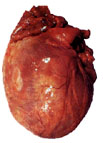|
The myocardium (heart muscle) can be affected by a multitude of diseases other than the most common: ischemic heart disease and hypertensive heart disease. A primary abnormality of the heart muscle is called a cardiomyopathy (from the roots "cardio" meaning heart, "myo" meaning muscle and "pathy" meaning disease), and there are many possible causes. The heart becomes enlarged and its pumping action reduced (see photo below).
Idiopathic cardiomyopathy is a term used to expressed when the cause is unknown. There are hereditary cardiomyopathies, the genetics of which are currently being studied. There are cardiomyopathies where doctors know the cause. These can usually be treated successfully. Chief among these are the cardiomyopathies caused by alcohol abuse, and underactive thyroid (hypothyroidism), and iron overload disease (hemochromatosis). All of these types of cardiomyopathies can cause severe congestive heart failure. All three should be looked for in anyone who has what appears to be a cardiomyopathy because all can be treated successfully.
Viral infections of the heart can cause heart damage. In some cases, the damage is self-limited and ends when the infection is cured; in other cases it's ongoing and is felt to be the cause of some of the so-called idiopathic cardiomyopathy that doctors see.

There is one cardiomyopathy that affects only women. It's called peripartum cardiomyopathy and occurs in the last trimester of pregnancy or within six months of delivery. This condition is thought to be an autoimmune disease, in which the body attacks its own tissues. The body has the ability to recognize foreign tissue. When it does, it manufactures antibodies, which are proteins that attack and destroy the invaders. This process is called the immune response. People who receive organ transplants need to be on medication to combat this immune response so that their bodies don't reject the tissues of the transplanted organ (unless their transplanted organ comes from an identical twin who is genetically and immunologically indistinguishable). The uterus, like the heart, is made up of many muscles. Sometimes in the latter weeks of pregnancy, proteins from the uterine muscle leak into the mother's bloodstream. Some women manufacture antibodies against these uterine muscle proteins, which are similar to the proteins that make the heart contract. The antibodies then attack heart cells causing the heart muscle to weaken and dilate. Viral infection is also thought to be a cause of this form of cardiomyopathy.
Peripartum cardiomyopathy is treated with bed rest and medications. Luckily, this condition is rare, occurring in between 1/1300 and 1/15,000 pregnancies. Women over 35, African-American women, those carrying twins or triplets, malnourished women, and women with high blood pressure have a higher risk of developing this disease. Unfortunately, some women never recover and go on to develop chronic congestive heart failure with a death rate of 85% within five years. Among women whose hearts don't return to normal functioning, future pregnancies are associated with a 50% risk of maternal death. Even in women whose heart function returns to normal, subsequent pregnancy is associated with a 10% risk of death. For these reasons, a woman with peripartum cardiomyopathy is advised to avoid future pregnancies. Cardiac transplantion can be performed in those women who go on to develop severe congestive heart failure. Cardiac transplantation is the treatment of last resort for all eligible patients with end-stage incurable cardiomyopathies.
Links:
webmd.com
emedicine.com
cardiologyonline.com
cnn.com/health/library
Source: Grateful acknowledgement to "How to Keep from Breaking Your Heart" by Barbara Roberts, MD, FACC, © 2004 Jones and Bartlett Publishers, Sudbury, MA. WWW.jbpub.com. Reprinted by permission.
|


























